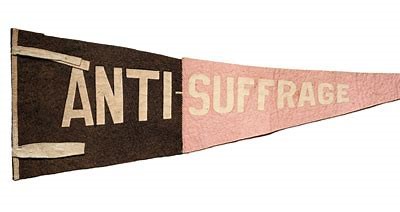While people are familiar with the Suffragist movement of the 19th and early 20th centuries that sought to gain equal rights for women, it is hard for us today to imagine that there were women who fought against this.
In the 1880s, Massachusetts was one of the first states to organize an anti-suffrage group, and in 1911 Josephine Jewell Dodge founded the National Association Opposed to Woman Suffrage. The anti-suffrage advocates believed that giving women the same rights as men would lead them to neglect their domestic duties and destroy the balance of society.
With such strong beliefs on both sides of the issue, the arguments among the Penrose sisters of Carlisle must have been heated. The four Penrose sisters, Virginia, Ellen, Valeria, and Sarah grew up in the large and elegant brick house on East High Street. Their father, William McFunn Penrose, and their mother, Valeria Merchant, were both from prominent families. Their father died in 1872, and after their mother’s death in 1909, they lived the rest of their lives in the family home. They were independently wealthy and never married.
While both Valeria and Sarah were anti-suffragettes, their sister Ellen was in favor of the vote for women. Valeria felt so strongly about her opposition to the suffragette movement that she demanded Carlisle’s Sentinel newspaper print a retraction of a statement about her. It read: “It was not Miss Valeria Penrose who was in Washington as this paper stated, but Miss Ellen W. Penrose. Miss Valeria Penrose desires us to state that she is not a suffragette, but that her sister, Miss Ellen is.”1
In April 1914, Valeria and Sarah attended the meeting of the State convention of the Pennsylvania Association Opposed to Woman Suffrage held in Harrisburg. Mrs. Arthur Dodge, president of the national association presided, and the speakers included women from several states.2
Valeria Penrose, as the leader of the anti-suffragette movement in the area, presided over a lecture given in Carlisle on the evening of May 25, 1914. The newspaper reported that “the courthouse was packed to its capacity with interested spectators…of both “Pros” and “Antis.” Miss Lucy Price of Cleveland, Ohio gave an hour-and-a-half lecture after which Miss Penrose declared the meeting open for discussion.3
The United States’ entry into World War I helped change the public’s mind about rights for women. Many states in the west had already given women their rights, and almost two million women voted in the 1916 presidential election.
The Nineteenth Amendment to the Constitution, which prohibited the states and the federal government from denying the right to vote to United States citizens based on sex, passed in the House of Representatives in May 1919 and in the Senate in June 1919, and was adopted. It was then submitted to the states for ratification. On June 24, 1919, the Pennsylvania legislature voted to ratify the Nineteenth Amendment which was officially adopted on August 26, 1920.
Fortunately for Valeria Penrose, she did not live to see that day. The Philadelphia Inquirer ran the following notice of her death in their September 5, 1916, issue.
Carlisle, PA. Sept. 4, 1916. Miss Valeria B. Penrose, a cousin of United States Senator Boies Penrose and a leading anti-suffragist, died at her home here today after a protracted illness. She was the daughter of William M. Penrose, a prominent attorney and Valeria Merchant, a daughter of General Merchant. She was one of the founders of the Civic Club and active in cultural projects in the town and county and was the leader of the anti-suffrage movement in this section. The family has wide connections in Philadelphia, Baltimore, and New York city. Miss Penrose is survived by three sisters.

